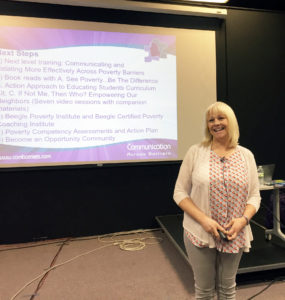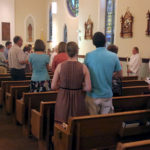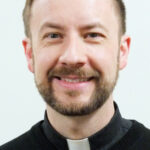(Editor’s Note: More than 12,000 people experienced homelessness in Iowa in 2015, according to the Institute for Community Alliances. In this article, the fifth in a series, The Catholic Messenger features a woman who overcame poverty and occasional homelessness.)
By Barb Arland-Fye
The Catholic Messenger
MUSCATINE — Donna Beegle, once a divorced mom of two with an eviction notice hanging over her head, broke through poverty’s barriers to become an inspirational speaker, writer and educator on the topic.

Donna Beegle speaks on overcoming poverty and occasional homelessness at a talk April 4 at Muscatine Community College.
She didn’t do it alone; she had the love and support of her extended family, she told her audience April 4 at Muscatine Community College. Today, she leads “Communications Across Barriers,” a consulting firm dedicated to improving communication and relationships across poverty barriers.
People living in poverty, she explained, don’t have the same life experiences or opportunities as those living in the middle or upper class, which creates a barrier to communicating, learning and working. She crossed that barrier and now teaches people across the country what it takes to do so. “I am bilingual,” she told her audience. “I speak fluent ‘middle-class language.’”
The Portland, Ore., native kept her audience riveted with her insider’s view of the humiliating experiences of generational poverty and how she overcame it. “I was born into a migrant labor family,” she said, “living for food for that day.” Kids bullied her at school, she said, because of the way she talked and the clothes she wore. Her dad wept over not being able to better support his wife and six children. And she remembered him asking her mom whether he should hold back a little of the rent money to buy groceries. “Poverty teaches you that no one cares; people don’t look you in the eye.” Segregation occurs in this country by social status, she declared.
At age 15, Donna quit school to get married. She wanted to be a wife and mother because family was a precious gift she could hold onto. “Your ‘people’ become who you have. They are yours.”
Her teacher’s attempt to motivate her — stay in school so you can get a job — failed. Donna saw how hard her family members worked and they still got evicted! She married a 17-year-old who also grew up in poverty.
Ten years later, Donna was divorced with two young kids and desperate to keep a roof over their heads and the utilities on. Her search for help led to participation in a pilot project that assisted single women with gaining education or skills needed to support their families. Donna participated because the organizers dangled a carrot: a Section 8 housing voucher. “That was the motivation.”
The program proved to be a lifesaver. She gained life skills, earned her GED, and was encouraged to continue her education, ultimately earning a doctorate.
A college professor at the University of Portland, Bob Fulford, helped her to improve her grammar and to learn more about the world by reading newspapers. He linked her to other professors for mentoring, as well. “Bob Fulford was the essential model of a mentor,” Donna writes in her book “See Poverty … Be the Difference” (2007). “He believed in me. He believed there was a way out of poverty. He met me where I was, never judging but always moving me forward.”
She urged her audience to “work together to fight poverty and not the people who live in it.” Too often, people who have never experienced poverty assume, wrongly, that those who live in the “war zone of poverty” don’t try hard enough, she said. “The word ‘enable’ has become an excuse for not helping.” Not a single person in the world is self-sufficient, she added.
“When you touch the lives of someone living in the crisis of poverty, you not only affect them; it ripples into their family, their friends, the community,” Donna said. In her “See Poverty” book, Donna identifies key points to keep in mind in striving to be the difference in the lives of people living in poverty. These points include:
• Meet people where they are and expose them to possibilities provided naturally in a middle-class context.
• Identify the strengths of a person living in poverty so that person sees hope and opportunity.
• Suspend judgment; assume people are making the very best decisions possible within their context.
• Develop empathy.
• Go the extra mile to help someone in poverty, even if it’s not in your job description.
• Be vocal about social issues; commit to transformative change that will help eradicate poverty’s causes.
• Create a paradigm for working with people in poverty that is inclusive, compassionate, supportive and long-term.
• Effective help requires building partnerships, creating support systems and eradicating systemic barriers.
“Listening to Donna’s story broadens your understanding of generational poverty, transforms your perspective, and opens your eyes to possibilities for our entire community, especially our children, said Charla Schafer, executive director of the Muscatine Center for Social Action (MCSA). The center was among the co-sponsors of Donna’s presentations in Muscatine to 500 community members and 125 high school students.
Resources
“If not me, then who?” a new book on poverty awareness by consultant Donna Beegle, will be released April 21.
The Society of St. Vincent de Paul will distribute the book, video trainings and guide to facilitators across the country “to build poverty competencies and to ensure that we are fighting poverty, not people,” Donna said.
For more information about poverty awareness visit www.combarriers.com.











